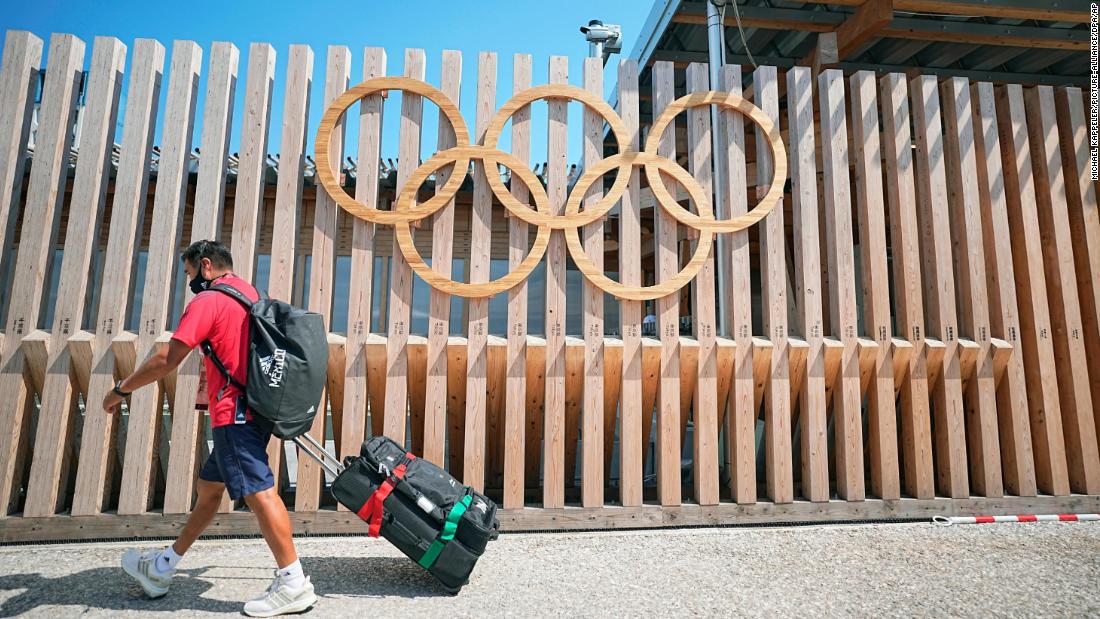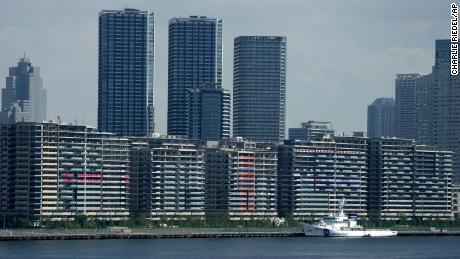No wonder, then, that the Tokyo 2020 Olympics has been forced to break with a number of traditions as the global pandemic forces organizers to mastermind a mega-sporting event unlikely any other.
Spectators will also be absent from 97% of Olympic competitions, with “virtual cheering” and a screen at events for fans to send in selfies and messages of support to athletes instead.
While opinion polls have consistently highlighted the unpopularity of the Games among the Japanese public, organizers hope the focus will quickly move away from the global pandemic once the serious competition gets underway after Friday’s Opening Ceremony.
Nonetheless, questions remain over how Tokyo can hold a massive sporting event and keep volunteers, athletes, officials — and the Japanese public — safe from Covid-19.
That febrile environment has ensured that Tokyo has a tough task not to be the first ‘no-fun’ Olympics.
Inside the village
The athletes’ village at the Olympics Games is typically viewed as a place where thousands of the world’s best athletes from more than 200 countries congregate and get to know each other a little bit better, as well as sharing stories and experiences.
However, at this Games, organizers are asking athletes to dine alone and maintain social distancing from others. In a TikTok video on Wednesday, Australian water polo star Tilly Kearns detailed the team’s rigorous health protocols in the village’s canteen — athletes are only allowed 10 minutes to eat their food.
Kunihiko Okamoto, vice president of Okamoto Industries, which was asked to supply some of the condoms by Games organizers, said the number of prophylactics was reduced due to the pandemic.
“Before the pandemic, we thought the Olympics are a great opportunity to showcase our products — it is important to raise more awareness around STDs. But during the pandemic, and given the situation, we feel there are more important things in the world than talking about the importance of condoms,” said Okamoto.
Rumors debunked
As athletes settle into their new accommodation at the Olympic Village, many are testing out what’s on offer.
Paul Chelimo, a runner for Team USA, claimed on his Twitter account that the “beds to be installed in Tokyo Olympic Village will be made of cardboard, this is aimed at avoiding intimacy among athletes.”
“Beds will be able to withstand the weight of a single person to avoid situations beyond sports,” he added.
However, the idea that the beds with cardboard frames would be for “anti-sex” purposes [AND?]would collapse under the weight of more than one person was quickly debunked by one Olympic athlete.
Irish gymnast Rhys McClenaghan posted a video on Twitter of himself jumping up and down several times as he tested out his bed’s sturdiness, before claiming: “It’s fake! Fake news!”
Tokyo 2020 says the beds will be “turned into recycled paper after the Games.”
“We are promoting the use of recycled materials for procured items and construction materials at the Tokyo 2020 Games,” the Games’ official “Sustainability Pre-Games Report,” said.
Competing with Covid
Despite the Covid-19 protocols, coronavirus cases in Tokyo — currently under a state of emergency until August 22 — show no signs of slowing.
Tokyo reported 1,832 new Covid-19 cases on Wednesday, its highest daily increase since January 16, according to Tokyo Metropolitan Government.
“Without the proper measures in place, it will only take one person to bring in the virus and spread it, especially in places like the athlete village,” infectious disease expert Nobuhiko Okabe said at a news conference Friday.
“We have to do what we can to make sure an outbreak doesn’t happen, and we really need the cooperation of all the athletes and delegations to make this work,” he added.
Olympic organizers have not included any specifics about sex in the playbook outlining Covid-19 countermeasures, though social distancing protocols would make it more challenging.
But Maki Hirayama, a sociologist and expert on sexuality at Meiji University, argued athletes who’ve been preparing to compete at the Games will likely still be looking for ways to let off steam — even amid the pandemic.
“(Humans) need a release, and all the top athletes of the Olympics had to focus on their training … and we cannot live only with concentration; we need a release. Sexual activity can provide (people) the biggest release,” she said.







